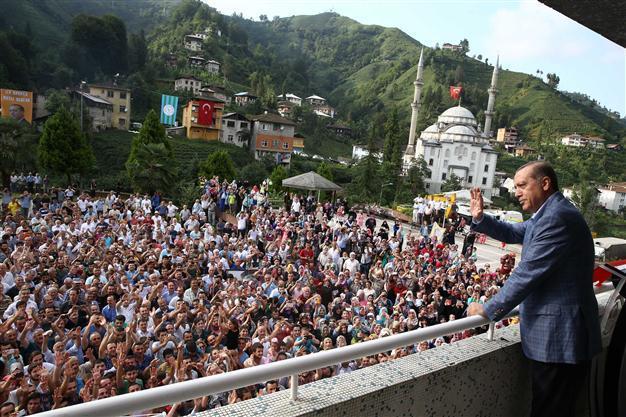Erdoğan’s declaration of ‘system change’ outrages Turkey’s opposition
ANKARA

AA photo
President Recep Tayyip Erdoğan’s declaration of a de facto shift in Turkey’s administrative system to a presidential system has infuriated opposition leaders, who say the declaration indicates “rule by diktat.”In remarks delivered in his hometown, the Black Sea province of Rize, on Aug. 14, Erdoğan said Turkey had witnessed a change in the president’s new role and asked for the constitution to be updated to recognize his de facto deployment of enhanced powers.
“There is a president with de facto power in the country, not a symbolic one. The president should conduct his duties for the nation directly, but within his authority. Whether one accepts it or not, Turkey’s administrative system has changed. Now, what should be done is to update this de facto situation in the legal framework of the constitution,” he said.
The remarks came exactly a day after incumbent Prime Minister, the leader of the Justice and Development Party (AKP), Ahmet Davutoğlu, failed to forge a coalition alliance with the Republican People’s Party (CHP), edging Turkey closer toward new elections.
According to CHP leader Kemal Kılıçdaroğlu, Erdoğan’s statement marked the “acknowledgement of a coup.”
“He [Erdoğan] wants this coup that he initiated to be settled on legitimate, legal grounds. He says, ‘I want this to happen by making a constitutional change.’ He wants to implement the coup process in the same way that putschist Kenan Evren did [before Turkey’s 1980 military coup]. A putschist first stages the coup and then builds the coup’s legal infrastructure,” Kılıçdaroğlu told daily Hürriyet.
In the run-up to the presidential election in August 2014, which he won in the first round, Erdoğan repeatedly stated that the current constitution grants “executive power” to a president who comes to office via the popular vote, just as the 1982 constitution granted “executive power” to the 1980 coup leader Kenan Evren.
Meanwhile, Nationalist Movement Party (MHP) leader Devlet Bahçeli also slammed Erdoğan through messages posted to his Twitter account over the weekend.
Bahçeli said that both “ethical and legal systems of the country are in a mess,” implicitly blaming 13 years of AKP rule for this situation.
“But when did the state and governance system change? This is unknown! If the governance system is under the control of one person, woe is us! It should be known that we cannot tolerate a home-product Hitler, Stalin or Gaddafi. Turkey is bigger than one person,” Bahçeli said.
A senior executive of the Peoples’ Democratic Party (HDP), however, suggested that Erdoğan’s remarks reflected a bitter truth.
“In his own presidential palace, with his own discretionary fund, he [Erdoğan] is acting as president of the country in a way that Turkey doesn’t deserve, in violation of the laws and the constitution,” said Pervin Buldan, the deputy parliamentary group chair of the HDP.
“He is trying to get the presidential system de facto settled. He put this into force after winning the presidential election,” Buldan added.
Since being elected to his current post, Erdoğan has chaired a number of cabinet meetings, arguing that this is a constitutional right granted to any head of the Turkish state.
Among the duties and powers relating to executive functions of the president, Article 104 of the constitution lists “presiding over the Council of Ministers or calling the Council of Ministers to meet under his or her chairmanship whenever he or she deems it necessary.”
















